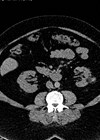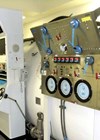Features
Prostate cancer in men of African heritage: understanding the risk and prognostic factors
Prostate cancer (PCa) represents a major public health concern and is recognised as one of the most common cancers worldwide, accounting for a significant proportion of cancer-related deaths. It is the second most common malignancy among men globally after lung...
Artificial intelligence in bladder cancer diagnostics
Bladder cancer (BCa), ranking as the 10th most common cancer worldwide, poses a significant health burden with high morbidity and mortality [1]. Timely tumour detection and accurate evaluation are crucial for effective management, as the prognosis is dependent on the...
Can dogs smell prostate cancer?
For centuries we have known that man’s best friend has an exceptional sense of smell. ‘Sniffer’ dogs are found in a wide range of roles, including drug and explosive detection as part of airport security, helping emergency services locate survivors...
Imaging and surveillance in sporadic renal angiomyolipoma: how and when to monitor effectively
Renal angiomyolipoma (AML) are benign tumours, accounting for approximately 2–3% of all renal neoplasms [1]. Seventy percent of renal AMLs are sporadic, and 20–30% are associated with genetic aetiology. They are composed of smooth muscle, blood vessels, and adipose tissue....
How do we tackle social injustice in urological cancer?
Socioeconomic status as an established determinant of health and associated injustices is well recognised. Confronting these injustices and creating a fairer healthcare system is an ongoing challenge for many governments. In Scotland, the devolved government has created the Scottish Index...
Urology around the world: An overview of healthcare in Germany
Germany boasts a highly developed and comprehensive healthcare system, renowned for its quality and accessibility. The urology landscape in the country mirrors this overall excellence, characterised by a well-structured network of specialists, advanced technology, and a strong emphasis on patient-centered...
Using change theories can help nurses implement better care in prostate cancer
Nurses can help support change in prostate cancer care by understanding change management and models and provide leadership in improving prostate cancer care. An important part of being able to lead change is to understand change theories such as the...
Action Bladder Cancer UK awards grants for bladder cancer research
Action Bladder Cancer UK has granted funding to enable vital research into bladder cancer as part of its annual ABC UK Improving Outcomes for Patients Programme (https://actionbladdercanceruk.org/abc-uk-grants/). The five grant recipients will undertake significant studies, ranging from the analysis of...
BAUS Annual Scientific Meeting 2024
Day 1 Toni Huw Mihailidis and Mriganka Mani Sinha Another year and another brilliant meeting in which urologists from the UK and around the globe assembled for a highly entertaining event. Day one kicked off with a topical and ever-pervasive...
From overseas to the UK: initial impressions
A few years ago we published stories from three international medical graduates detailing their experience of working as registrars in the UK (https://www.urologynews.uk.com/education/trainees-forum/post/initial-impressions-of-urology-in-the-uk-from-overseas-trainees). Here are three new countries and three new opinions. Dinelle Sirjuesingh, Trinidad and Tobago Trinidad and Tobago...
Management of RHC in prostate cancer with selective embolisation and hyperbaric oxygen therapy
Prostate cancer is one of the most prevalent malignancies affecting men worldwide. Radiotherapy is a common treatment modality for localised and locally advanced prostate cancer. While radiotherapy can be effective, it may lead to complications such as radiation-induced haemorrhagic cystitis...
Cutting-edge or over-hyped? Evaluating the role of robotic surgery in the management of renal cell carcinoma
The quest for a minimally-invasive approach to major abdominal surgery finds its roots at the start of the previous century, when Georg Kelling first described the technique of ‘ceolioscopy’ to inspect intraabdominal organs in 1901 [1]. Since those early days,...















